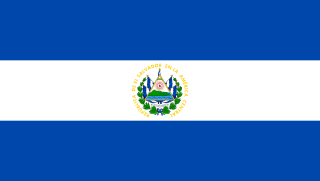
El Salvador, officially the Republic of El Salvador, is a country in Central America. It is bordered on the northeast by Honduras, on the northwest by Guatemala, and on the south by the Pacific Ocean. El Salvador's capital and largest city is San Salvador. As of 2018, the country had a population of approximately 6.42 million, making it the smallest and second-least populated country in Central America.

This article is about the demographic features of the population of El Salvador, including population density, ethnicity, education level, health of the populace, economic status, religious affiliations and other aspects of the population.

San Salvador is the capital and the most populous city of El Salvador and its eponymous department. It is the country's political, cultural, educational and financial center. The Metropolitan Area of San Salvador, which comprises the capital itself and 13 of its municipalities, has a population of 2,404,097.
Music of Nicaragua is a mixture of indigenous and European, especially Spanish, influences. Musical instruments include the marimba and others that are common across Central America. Pop music includes Cuban, Brazilian, Mexican and Panamanian performers, as well as those from Europe and the United States.

The music of El Salvador has a mixture of Lenca, Cacaopera, Mayan, Pipil, and Spanish influences. This music includes religious songs used to celebrate Christmas and other holidays, especially feast days of the saints with Tubular bells Chimes. Satirical and rural lyrical themes are common and played with Xylophone.

Central America is dominated by the popular Latin music, or Black Caribbean trends, including salsa, cumbia, mariachi, reggae, calypso and nueva canción. The countries of Central America have produced their own distinct forms of these genres such as Panamanian salsa, among others. One of the well-known forms of Central American music is punta, a style innovated by the syncretic Garifunas who live across the region, in Honduras, Nicaragua, Guatemala and Belize. The marimba, a type of xylophone, is perhaps the most important folk instrument of Central America, and it is widespread throughout the region.

General Manuel José Arce y Fagoaga was a decorated General and president of the Federal Republic of Central America from 1825 to 1829, followed by Francisco Morazán.

Maximiliano Hernández Martínez was the President of El Salvador from 4 December 1931 to 28 August 1934 in an acting capacity and again in an official capacity from 1 March 1935 until his resignation on 9 May 1944. He was the leader of El Salvador during World War II. While he served as President Arturo Araujo's Vice President and defense minister, a directorate seized power during a palace coup and afterwards named General Hernández Martínez President of El Salvador.

The culture of El Salvador is a Central American culture nation influenced by the clash of ancient Mesoamerica and medieval Iberian Peninsula. Salvadoran culture is influenced by Native American culture as well as Latin American culture. Mestizo culture and the Catholic Church dominates the country. Although the Romance language, Castilian Spanish, is the official and dominant language spoken in El Salvador, Salvadoran Spanish which is part of Central American Spanish has influences of Native American languages of El Salvador such as Lencan languages, Cacaopera language, Mayan languages and Pipil language, which are still spoken in some regions of El Salvador.

Tommy Olivencia was a renowned Puerto Rican bandleader of salsa music.
Ricardo F. J. Montenegro Palomo is a businessman and politician from El Salvador. He was the Minister of Treasury of El Salvador in the first months of Armando Calderón Sol's Presidency

José Matías Delgado y León was a Salvadoran priest and doctor known as El Padre de la Patria Salvadoreña. He was a leader in the independence movement of El Salvador from the Spanish Empire, and from November 28, 1821 to February 9, 1823 when he was president of the Central American constituent congress which met in Guatemala City.

Juan Manuel Rodríguez was a Salvadoran revolutionary against Spain and later president of the State of El Salvador within the Federal Republic of Central America.

Licenciado José Damián Villacorta Cañas was a Salvadoran lawyer and politician. He was chief of state of El Salvador from February 16, 1830 to December 4, 1830, while it was a state within the Federal Republic of Central America.

Colonel Joaquín de San Martín y Ulloa was a Salvadoran military officer and politician who was twice chief of state of the State of El Salvador, within the Federal Republic of Central America.

Carlos Salazar Castro was a Central American military officer and Liberal politician. Briefly in 1834 he was provisional president of El Salvador, and in 1839 he was provisional president of Guatemala.

Salvadorans, also known as Salvadorians or Salvadoreans, are people who identify with El Salvador, a country in Central America. Mestizos, people of mixed European and Amerindian heritage make up the bulk of the population in El Salvador. Most Salvadorans live in El Salvador, although there is also a significant Salvadoran diaspora, particularly in the United States, with smaller communities in other countries around the world.

Presidential elections were held in El Salvador on 12 January 1915. Carlos Meléndez Ramirez was the only candidate, and was elected unopposed.

The Salvadoran military government, officially known as the Republic of El Salvador, and simply known as El Salvador, was the period of time in Salvadoran history where the Salvadoran Armed Forces governed the country for almost 48 years from 2 December 1931 until 15 October 1979. The authoritarian military dictatorship limited political rights throughout the country and maintained its governance through rigged and fixed elections.

El Salvador–Spain refers to the current and historical relations between El Salvador and Spain. Both nations are members of the Association of Academies of the Spanish Language, Organization of Ibero-American States and the United Nations.
















